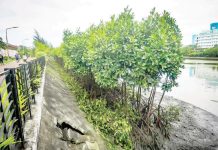
IN ILOILO City, biking has become a convenient option for some commuters due to the coronavirus disease pandemic which has somehow adversely affected public transport. Recently, the Iloilo City government bared a plan to interconnect bike lanes all over the metro for easier and safer mobility of those biking to work. Yes, years before this pandemic started, Iloilo City already has bike lanes.
Protected bike lanes are essential for building better, more liveable cities. These should in fact be part of comprehensive city planning. And people should learn to appreciate the far-reaching benefits of establishing a cycling lane network along main roads. Bike lanes are not just for bikes and bikers, but for everyone living and working in cities. With the right planning, they could provide pedestrians and commuters with safer, wider room to move even at a busy road.
Because of urban planning that has prioritized motor vehicles running on fossil fuels, the resulting air pollution has made cities unhealthy for ordinary citizens. Globally, cities account for 75 percent of global greenhouse gas emissions, a great part of it is from fossil fueled transport. Cities that provide more opportunities for active mobility such as biking and walking will create less need for cars. This means less air pollution, and a huge opportunity for climate mitigation.
Moreover, protected bike lanes are an important component in planning a healthier, greener design for our cities. Imagine a city not just with bike lanes, but with more trees, more green public spaces, and more room for everyone to breathe. This is what we want to see when we ask for liveable cities, for a better normal beyond this pandemic.
Fortunately for biking and environmental advocates, there is growing interest in the government to make permanent, safe bike lanes happen. “We are starting with the issuance of the Joint Administrative Order that will guide the national government agencies and local government units in the implementation of active transport projects and policies, signed by the departments of Health, Transportation, Interior and Local Government, and Public Works and Highways,” said Engineer Eldon Joshua Dionisio of the Department of Transportation.
The public should support these developments, but for the sake of the people banking on a future with people-centric roads, we hope the government will soon produce a concrete plan for permanent bike lanes across the country.
The fact that we got this far – as far as Iloilo City is concerned – is proof that collective citizen action can disrupt public discourse and influence our leaders to do right by its people. Therefore, we must remain steadfast in calling for this and other solutions that will improve our quality of life — not just in Iloilo City but in the whole country.





